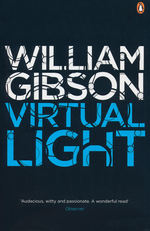
Bridge (TPB) nr. 1: Virtual Light (Gibson, William)
Now, with his most fascinating novel to date, Gibson looks into our very near future, bringing it into sharp and darkly comic focus. Welcome to NoCal and SoCal, 2005, the uneasy sister-states of Northern and Southern California, in a nation and society still divided along seismic fault lines of wealth and power...chasms seldom crossed except in fear, exploitation, or violence. The millennium has come and gone, leaving in its wake the ruins of our outworn modern era and the first chaotic suggestions of a new paradigm. In Tokyo a new city is growing from the rubble of Godzilla the Superquake. In San Francisco Mr. Yamazaki, a Japanese anthropology student, investigates the deeper meaning of an anarchic squatter community constructed around the disused Bay Bridge. Meanwhile, in Los Angeles, Berry Rydell just wants to make a living. Not the easiest thing for an ex-cop from Tennessee to do - now that the network has decided not to base that episode of Cops in Trouble on his brief but all too eventful career with the Knoxville P.D. Rydell signs on with IntenSecure Armed Response, driving a six-wheeled Hotspur Hussar... It's only a matter of time before he runs into Chevette Washington, a bicycle messenger who has just crashed the wrong party...and who is about to pick the pocket of another kind of courier - an employee of Costa Rica's Medellin-financed havens of illicit data. When IntenSecure sends Rydell to San Francisco to drive for Lucius Warbaby, a skip-tracer in the Virtual Reality maze of DatAmerica, Rydell and Chevette find themselves on a journey into the ecstasy and dread that mirror each other at the heart of the postmodern experience. A tour de force of relentless suspense, daring insight, and graphic intensity Virtual Light is a provocative and unforgettable portrait of life on the edge of the twenty-first century.
Udgivet af Penguin UK 1905
William Gibson
William Ford Gibson (born March 17, 1948) is an American-Canadian writer who has been called the "noir prophet" of the cyberpunk subgenre of science fiction. Gibson coined the term "cyberspace" in his short story "Burning Chrome" and later popularized the concept in his debut novel, Neuromancer (1984). In envisaging cyberspace, Gibson created an iconography for the information age before the ubiquity of the Internet in the 1990s. He is also credited with predicting the rise of reality television and with establishing the conceptual foundations for the rapid growth of virtual environments such as video games and the Web.
Having changed residence frequently with his family as a child, Gibson became a shy, ungainly teenager who often read science fiction. After spending his adolescence at a private boarding school in Arizona, Gibson dodged the draft during the Vietnam War by emigrating to Canada in 1968, where he became immersed in the counterculture and after settling in Vancouver eventually became a full-time writer. He retains dual citizenship. Gibson's early works are bleak, noir near-future stories about the effect of cybernetics and computer networks on humans – a "combination of lowlife and high tech". The short stories were published in popular science fiction magazines. The themes, settings and characters developed in these stories culminated in his first novel, Neuromancer, which garnered critical and commercial success, virtually initiating the cyberpunk literary genre.
Although much of Gibson's reputation has remained associated with Neuromancer, his work has continued to evolve. After expanding on Neuromancer with two more novels to complete the dystopic Sprawl trilogy, Gibson became an important author of another science fiction sub-genre—steampunk—with the 1990 alternate history novel The Difference Engine, written with Bruce Sterling. In the 1990s, he composed the Bridge trilogy of novels, which focused on sociological observations of near-future urban environments and late capitalism. His most recent novels—Pattern Recognition (2003) and Spook Country (2007)—are set in a contemporary world and have put his work onto mainstream bestseller lists for the first time.
Gibson is one of the best-known North American science fiction writers, fêted by The Guardian in 1999 as "probably the most important novelist of the past two decades". Gibson has written more than twenty short stories and nine critically acclaimed novels (one in collaboration), and has contributed articles to several major publications and collaborated extensively with performance artists, filmmakers and musicians. His thought has been cited as an influence on science fiction authors, design, academia, cyberculture, and technology.

